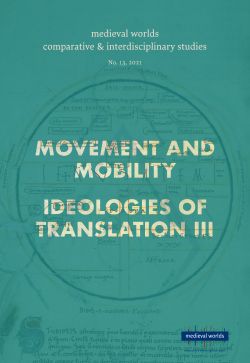|
 |
medieval worlds provides a forum for comparative, interdisciplinary and transcultural studies of the Middle Ages. Its aim is to overcome disciplinary boundaries, regional limits and national research traditions in Medieval Studies, to open up new spaces for discussion, and to help developing global perspectives. We focus on the period from c. 400 to 1500 CE but do not stick to rigid periodization.
medieval worlds is open to submissions of broadly comparative studies and matters of global interest, whether in single articles, companion papers, smaller clusters, or special issues on a subject of global/comparative history. We particularly invite studies of wide-ranging connectivity or comparison between different world regions.
Apart from research articles, medieval worlds publishes ongoing debates and project and conference reports on comparative medieval research.
Editorial
Walter Pohl and Ingrid Hartl
Movement and Mobility in the Medieval Mediterranean:
Changing Perspectives from Late Antiquity to the Long-Twelfth Century, I
Guest Editors: Christopher Heath, Clemens Gantner and Edoardo Manarini
Introduction: Movement and Mobility in the Medieval Mediterranean:
Changing Perspectives from Late Antiquity to the Long-Twelfth Century
Christopher Heath, Clemens Gantner and Edoardo Manarini
Aspects of Movement and Mobility in Lombard Law: Fugitives, Runaway Slaves and StrangersAspects of Movement and Mobility in Lombard Law: Fugitives, Runaway Slaves and Strangers
Christopher Heath
Ad utriusque imperii unitatem? Anastasius Bibliothecarius as a Broker
between Two Cultures and Three Courts in the Ninth Century
Clemens Gantner
Holiness on the Move: Relic Translations and the Affirmation of Authority
on the Italian Edge of the Carolingian World
Francesco Veronese and Giulia Zornetta
The Translation of St Sylvester’s Relics from Rome to Nonantola: Itineraries of corpora sacra
at the Crossroads between Devotion and Identity in Eighth-Tenth-Century Italy
Edoardo Manarini
Ideologies of Translation, III
Multilingual Sermons, II
Guest Editor: Jan Odstrčilík
Bilingualism in the Cambrai Homily
Gwendolyne Knight
Between Innovation and Tradition: Code-Switching in the Transmission
of the Commentary to the Félire Óengusso
Nike Stam
Jacobus de Saraponte’s Aurissa: Evidence for Multilingual Preaching
Jan Odstrčilík
Language Mixing as a Persuasive Strategy in Oxford, MS Bodley 649
Helena Halmari
Individual Articles
The World Map of the Corpus Pelagianum (BNE, 1513, fol. 1v) and its Strategies of Identification
Patrick S. Marschner
The Pleasures of Virtue and the Virtues of Pleasure:
The Classicizing Garden in Eleventh- and Twelfth-Century China and Byzantium
Curie Virág and Foteini Spingou
Sectarian Rivalry in Ninth-Century Cambodia: A Posthumous Inscription
Narrating the Religious Tergiversations of Jayavarman III (K. 1457)
Dominic Goodall and Chhunteng Hun
Project Report
The European Qur’ān: The Place of the Muslim Holy Book in European Cultural History
John Tolan
|




 Home
Home Print
Print
 References
References
 Share
Share
